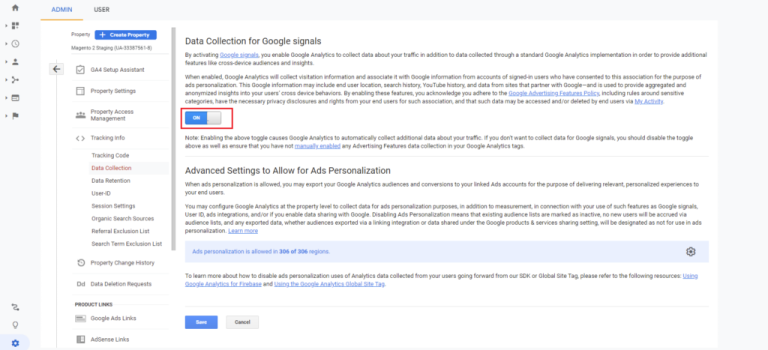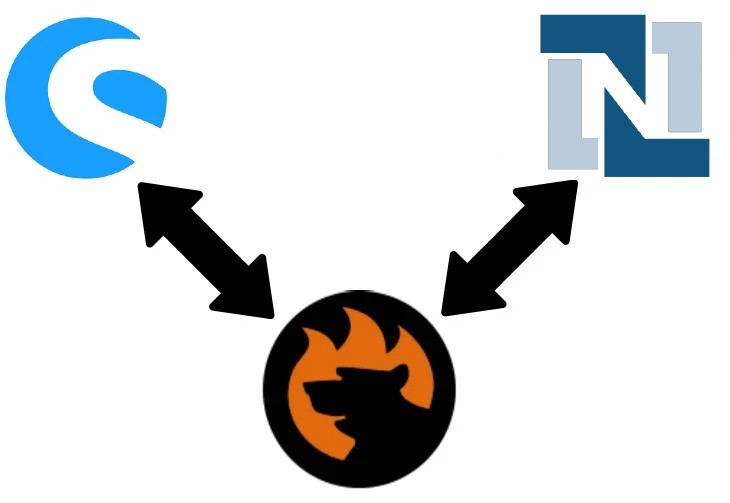
Oracle NetSuite is a very powerful ERP that provides solutions for different industries and scales. The next generation of business apps unleashes the potential hidden behind every organization, helping streamline the latest technologies. However, it is not possible to get all the benefits by default. You always need to synchronize the data flow between your e-commerce website and the ERP platform. In the following article, we shed light on the most user-friendly way to conduct the Shopware 6 Oracle NetSuite integration. If you are looking for a tool designed to unleash your e-commerce potential, you’ve come to the right place. Below, we shed light on the digital transformations associated with the Oracle NetSuite ERP. This major platform exists among such giants as Microsoft Dynamics 365 Business Central. Therefore, let’s explore its numerous aspects first and then directly proceed to the Oracle NetSuite Shopware 6 integration.
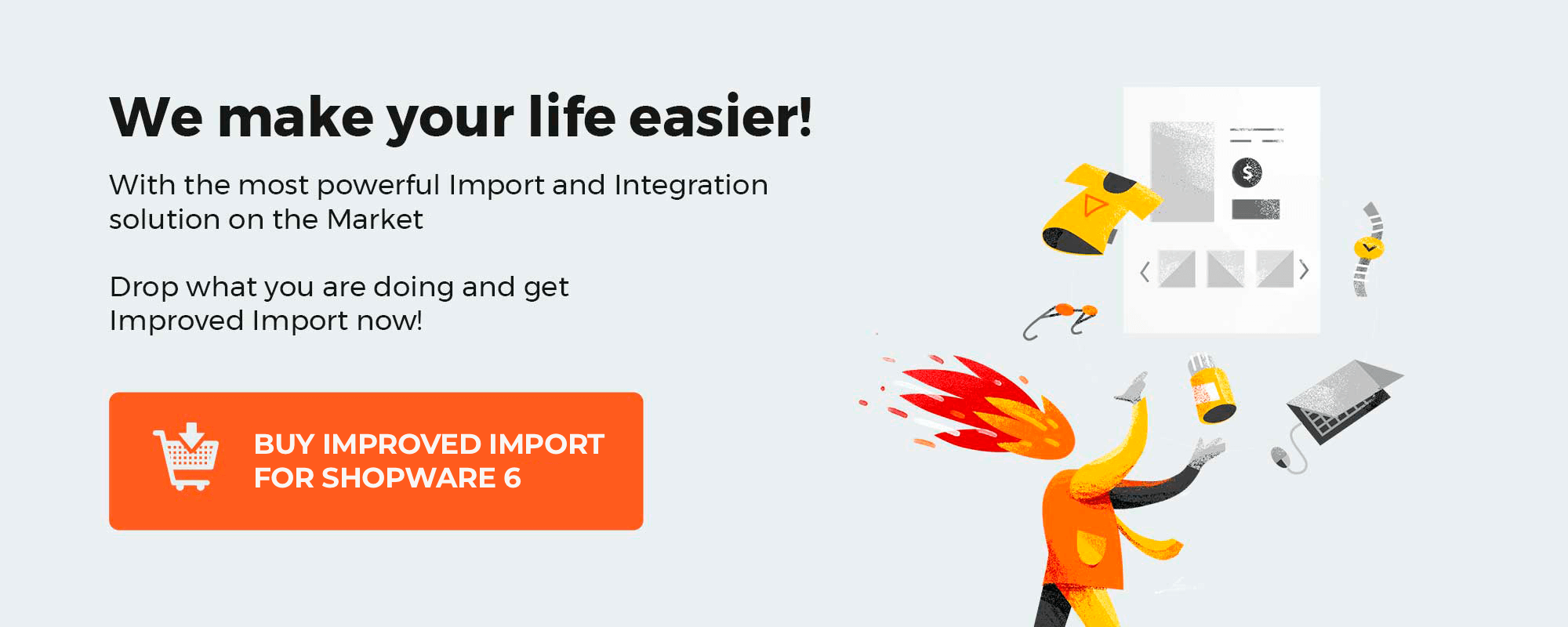
Use our Improved Import, Export & Mass Actions application to run the Shopware 6 NetSuite integration. We can customize our app so that it follows your individual business needs. Contact our support for further information.
Get the Improved Import, Export & Mass Actions Application for Shopware 6
Table of contents
NetSuite Defined
Being one of the most potent cloud ERP systems on the market, NetSuite is designed to bump the efficiency of businesses and run your Shopware 6 website more rationally and cost-effectively, addressing complex problems in the following areas:
- Enterprise resource planning (ERP);
- Financial management;
- Accounting;
- E-commerce;
- Customer relationship management (CRM);
- Inventory management.
This all-in-one solution eliminates the necessity to combine separate tools and integrate unconnected platforms. All the critical business functions are gathered in one place. You only need to create a seamless flow of information across all your channels and business points. We will focus on this aspect below. Now, let’s prove that Oracle offers solutions for every business.
Businesses of all sizes can use Oracle NetSuite

Since Oracle NetSuite offers solutions for businesses of all sizes, all its solutions are divided into the following groups:
- Fast-Growing Businesses. If you run a rapidly developing e-commerce enterprise based on Shopware 6 or other systems, you can leverage a unified, cloud-based platform that combines tools for numerous areas of your business, such as Financials and Accounting, Omnichannel Commerce, Order & Inventory Management, Sourcing, Procurement, CRM, Sales & Marketing, Warehousing, Customer Support, etc.
- Midsize Businesses. If your Shopware 6 e-commerce business is a little bit bigger than on average, Oracle provides an efficient cloud-based platform that eliminates on-premise IT costs, delivers integrated ERP and CRM, offers real-time dashboards and analytics, supports mobile access, and is flexible in terms of customization.
- Investment-Backed. Any unique demands associated with investments can be fully satisfied with Oracle. Accelerated timelines, limited budgets, aggressive environments, and other strict conditions are no longer a problem. NetSuite helps you create unique management structures to deliver executive alignment throughout the entire business lifecycle.
- Biggest Market Players. As for the world’s largest companies, Oracle lets them solve the biggest and most demanding challenges, such as merges, acquisitions, and divestitures. The ERP system provides the ability to unify business insights, discover new products suitable for particular markets and channels, as well as successfully implement business model innovations.
Businesses from or all industries can use Oracle NetSuite

Thousands of businesses all over the globe rely on NetSuite. They use this ERP system to empower their businesses and automate various management processes. And this widespread appreciation is associated with a broad gamut of functionalities and industry-specific features. Let’s explore different areas where NetSuite clients usually operate:
- Retail. The Shopware 6 NetSuite integration is responsible for combining all parts of your multi-channel, multi-location business. You can use it to connect and seamlessly sync e-commerce websites, brick-and-mortar stores, and POS terminals. Also, the platform offers the ability to automate order management, marketing, inventory, and financial processes. Accelerated customer support is another perk associated with the platform. Also, pay heed to the following retail solutions the platform delivers:
- Apparel, Footwear, and Accessories;
- Food and Beverage;
- Health and Beauty.
- Wholesale. The Shopware 6 NetSuite integration empowers you to streamline the B2B functionality of your e-commerce platform and multiply it with an outstanding suite of apps built into the ERP system. Advanced inventory replenishment, resource receiving, order promising, and numerous more enhancements are at your service.
- IT. NetSuite is designed to increase the profitability of IT companies through the 360-degree business view with the most in-depth insights into your enterprise. Leverage highly customizable dashboards to be aware of everything happening within your company.
- Manufacturing. As a manufacturer, you can streamline the Shopware 6 NetSuite integration, connecting all business processes in a single place. Achieve production, which is more compact in every sense. Control work orders, assembly, BOM, as well as demand-based replenishment more efficiently.
- Digital Marketing and Advertising. A standard agency workflow is another area that NetSuite can help streamline and automate. The system lets you evaluate account and project profitability, reducing time and expense.
- Financial Services. With Oracle, you can meet increasing regulatory compliance demands and ensures high levels of operational controls. The platform lets you leverage advanced management capabilities toward global operations and multi-subsidiary locations and implement other rationalization strategies.
- Healthcare. With the latest software achievements, NetSuite empowers you to reduce costs associated with the maintenance of hardware and software necessary associated with healthcare businesses. You achieve visibility across multiple departments and create a unified hub with the most in-depth insights.
- Other areas, where the NetSuite ERP is suitable, include:
- Education;
- Campus Stores;
- Consulting;
- Energy;
- Media;
- Professional Services;
- Restaurants and Hospitality;
- Software;
- Transportation and Logistics;
- NPO.
As you can see, the industry associated with your business doesn’t matter due to in-depth insights and numerous industry-specific enhancements NetSuite provides. The system lets you achieve success in forecasting, inventory management, profit calculations, and other business processes.
Everyone in your company can use Oracle NetSuite

Oracle NetSuite offers tools for every layer of your e-commerce business. At the same time, it is possible to leverage role-specific tools, split into the following four groups:
- CEO – this group of tools offers the ability to focus on revenue and company growth, re-evaluate the workforce, reduce costs, etc. Besides, you get the ability to focus on customers and improve profitability, increasing business value through financials, product quality, and company reputation.
- CFO – this group of tools offers an improved way of controlling financial reporting, audit and compliance, planning, treasury, and capital structure.
- Controller – this group of tools offers additional support for financial areas with the aim of improving business results and optimizing financial processes.
- CIO – this group of tools offers provides the ability to become more versatile and attuned to business strategy. You can streamline the emerging technologies and business models in the value chain, ensuring seamless upgrades and the latest industry achievements.
NetSuite is built in the cloud, ensuring advanced scalability and agility for continued evolution. Start small and go up with this ERP platform that rapidly adjusts to the ever-growing requirements of your enterprise. Streamline different aspects of the ERP platform depending on how huge your market appearance is.
Due to the highly-customizable nature of NetSuite combined with a broad range of functionalities, you can leverage this ERP system as a B2C merchant or a B2B entrepreneur, no matter what industry you occupy. The multi-currency and multilingual support lets you run your Shopware 6 website overseas. The NetSuite cloud-based ERP software is suitable for every company.
Oracle NetSuite Products

Below, you will discover a brief review of the main NetSuite products.
- Enterprise Resource Planning (ERP). Meet the NetSuite’s ERP platform a scalable system developed to run and automate financial business processes, including various back-office operations. It offers advanced financial management tools, financial planning solutions, order management capabilities, production management instruments, supply chain management functions, warehouse and fulfillment capabilities, procurement features, etc.
- Global Business Management (OneWorld). OneWorld is an integrated and unified platform for handling multiple currencies, taxation rules, and reporting requirements. So, if you a bound to multinational and multi-subsidiary operations, adjust it in accord with your currency, taxation, and legal compliance nuances to automate multiple daily duties. Among other features, you get the ability to streamline the complete lifecycle of your services: from marketing to service delivery.
- Customer Relationship Management. The NetSuite CRM follows all the demands in the area of your interactions with customers: from opportunity management to customer services right in the cloud. Along with the platform’s traditional CRM features, you get such solutions as quotes, commissions, sales forecasting, etc.
- Human Capital Management (SuitePeople). With this suite of tools, NetSuite offers an HR toolset built into the unified NetSuite cloud suite. You get robust functionality for managing core HR and workforce processes with complete control over employee information, onboarding, payroll, new hires, compensation changes, etc. Employees, in their turn, can request time-off, access directories, and organization charts, monitor vacation schedules, etc.
- Professional Services Automation (PSA). This system combines resource management, project accounting, and timesheet/expense management. Its project management capabilities let managers and other team members work together more efficiently, identifying and resolving potential issues. Due to the set of resource management features, it is possible to optimize staffing and utilization so that qualified resources participate in the right projects.
- OpenAir. This tool represents another PSA solution by Oracle. It is developed for the entire services organization with real-time visibility. If your goal is to enhance project management, automate billing and invoicing processes, and optimize revenue and profitability reporting, OpenAir is at your disposal.
- Omnichannel Commerce. With all its existence, NetSuite tries to satisfy the needs of an omnichannel enterprise. It provides the ability to integrate and synchronize e-commerce, marketing, and POS efforts with back-office activities, achieving consistent brand experiences across all channels.
- Email Marketing. NetSuite Bronto is a reliable email marketing tool designed to build steady customer engagements through personalization and automation. It provides the ability to evaluate the efficiency of your campaigns and improve targeting strategies.
- Analytics & Business Intelligence. The embedded analytics system of NetSuite is designed to discover hidden information across all the processes integrated with the platform across all company’s departments, teams, and subsidiaries.
- Experience & SuiteSuccess. NetSuite offers natural, fully-featured, and accessible products, secured by role-based authentication processes and backed by powerful reporting and business intelligence. Its customizable dashboards are fully personalized. Its instant enterprise collaboration is multiplied by extensive mobility.
[embedded content]
NetSuite Price
Since NetSuite has a complex structure with numerous core products and dozens of price tiers, we cannot name the exact price for the ERP system. Its cost varies depending on the size and complexity of your company. It would be better if you contact NetSuite for further specifications.
Oracle Netsuite Advantages & Disadvantages
Let’s take a look at the advantages and disadvantages of NetSuite before going any further.
Advantages
- Ease-of-use. Although the platform is exceptionally intuitive, it takes a little time and practice to learn the system. However, most tasks are as easy as using the search box at the top.
- Cloud nature. Due to the platform’s cloud nature, it is available anytime, anywhere.
- Scalability. As we’ve mentioned above, NetSuite is built to scale with the company’s growth. So, you can start a tiny Shopware 6 store, sync it with the ERP system, and continue growing.
- Reporting. NetSuite offers an advanced reporting system that may be hard to configure but can be tailored according to your needs. Furthermore, all its insights are displayed in the most user-friendly manner, providing the ability to run the most in-depth audit.
- Customization. If you want to customize the platform, you can freely change it following your most crucial business demands.
- Automation. As you can see, it is possible to automate numerous aspects of a daily routine with Oracle NetSuite.
- Integrations. NetSuite is good at integrating with other products and external systems. To connect it to Shopware 6, use Improved Import & Export. Note that some integrations are available by default!
Disadvantages
- Expences. NetSuite is oriented toward businesses of all sizes. However, it is often too expensive for small and middle companies. Also, consider that you need to spend more money to integrate it with your Shopware 6 website properly.
- Complicated Reports. While NetSuite offers powerful reporting capabilities, you still have to spend tons of time configuring reports. Designing a new report may seem less intuitive than you might have expected.
- Customizations. While NetSuite is open for customization, you may need lots of resources to implement it properly, especially when you want to apply new functionalities on top of the custom features.
- Configuration. The platform’s configuration is not reduced to a few clicks like in the case of Shopware. The robust enterprise software requires lots of attention before it starts working for you.
Oracle NetSuite Admin
Now, we will briefly explain the structure of the NetSuite admin. When you see its dashboard for the first time, you understand that it is way more complicated than the one you got used to in your Shopware admin. The starting page contains multiple blocks and windows with various data. However, after a brief exploration, you will easily understand the logic of blocks.
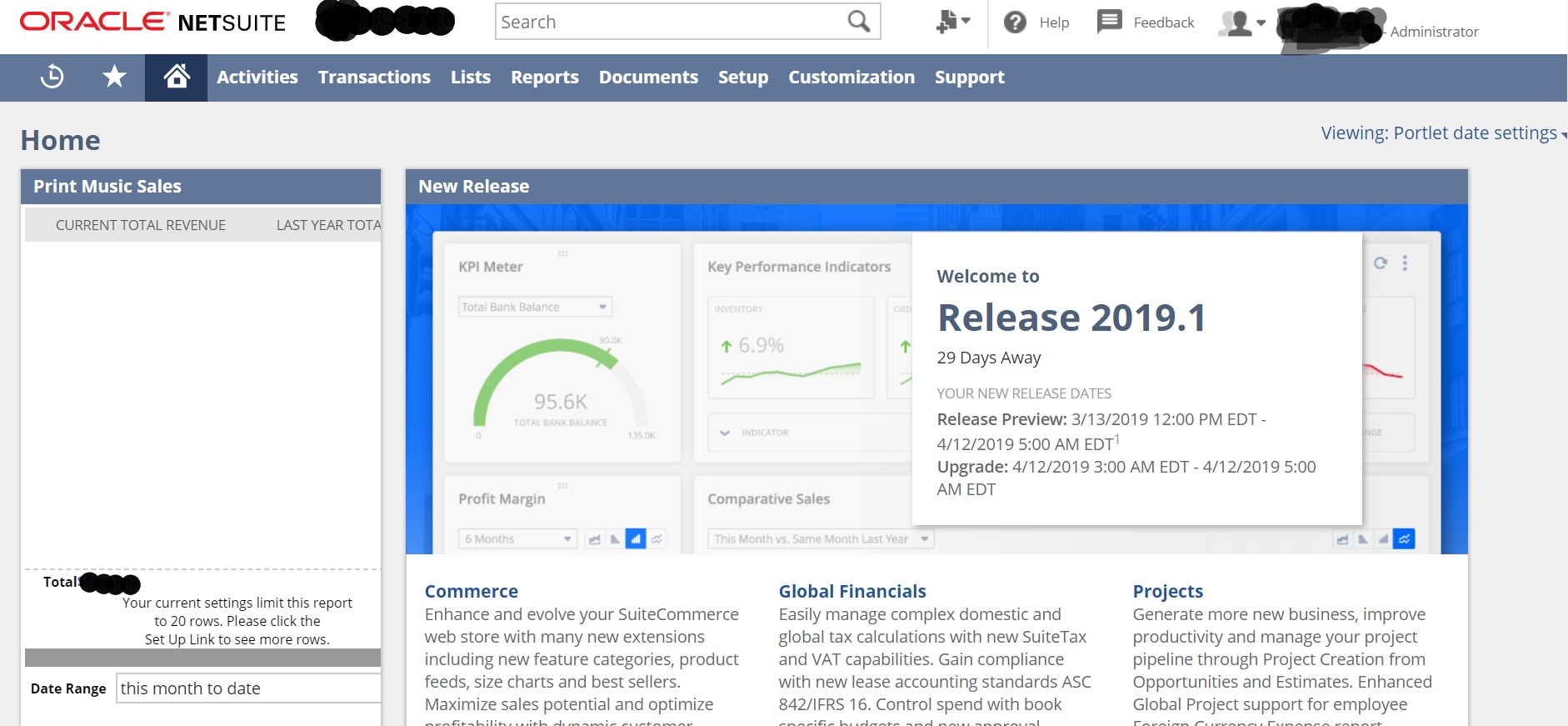
Scroll down to see a block with settings. It lets you personalize your dashboard, apply individual setting preferences, and configure other parameters. You can also use shortcuts here.
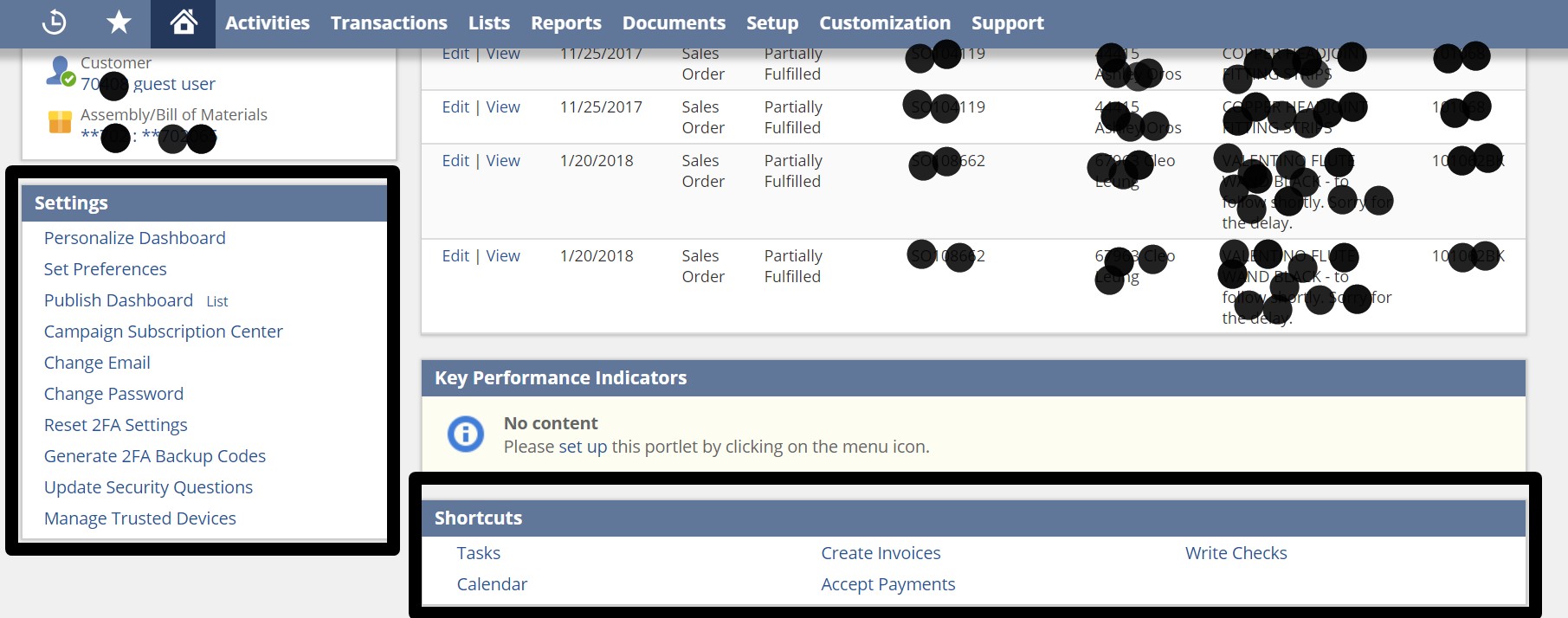
The top menu acts works a sticky element, remaining visible when you scroll.

Although there are many sub-sections in the menu, you need to start your acquaintance with the platform with the main pages only.
You can find various events and tasks in the Activities section. You can create them here or view the existing ones on a calendar.
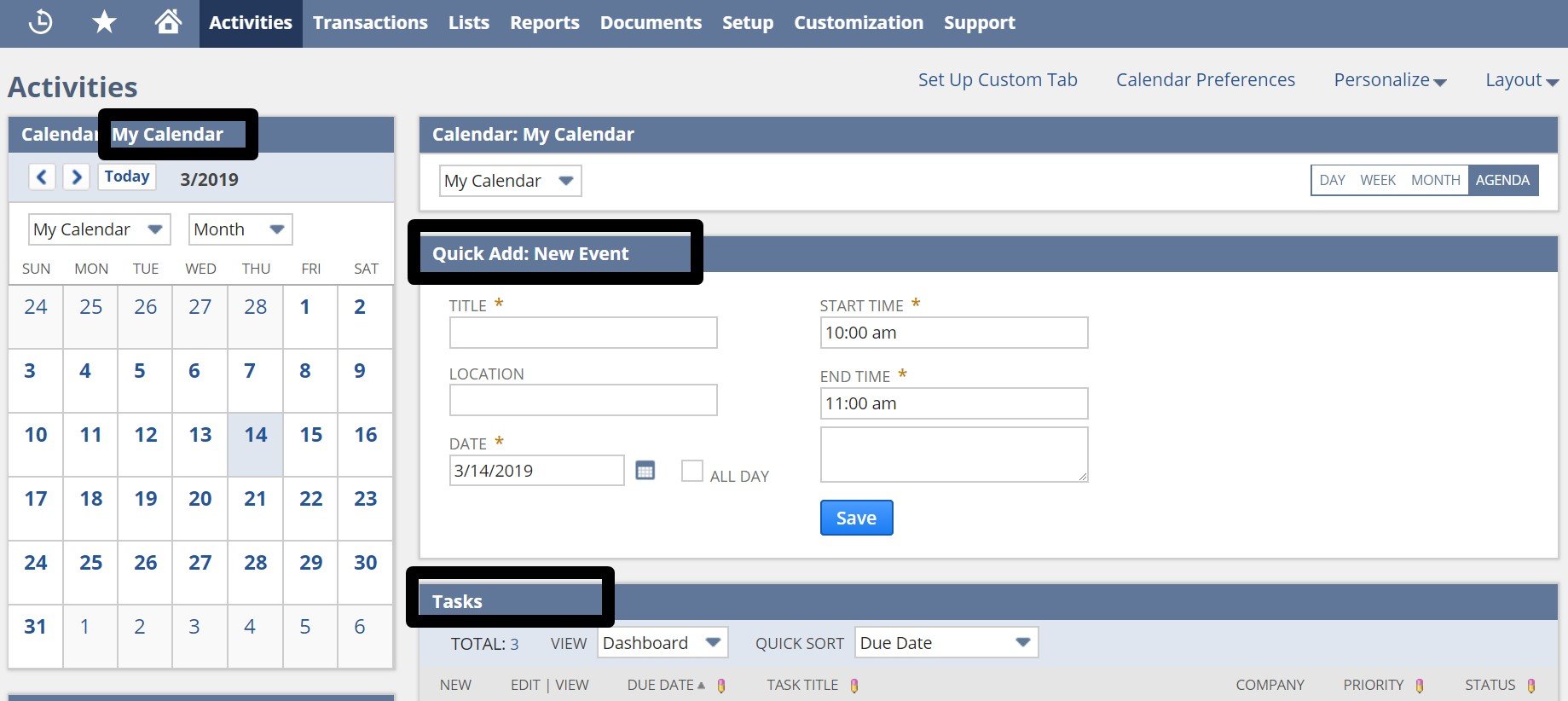
The Transactions screen contains a list of links divided into the following sections: Bank, Sales, Employees, Quota/Forecast, Purchases, Billing, Inventory, Financials, Payables, Customers, Manufacturing, and Management.
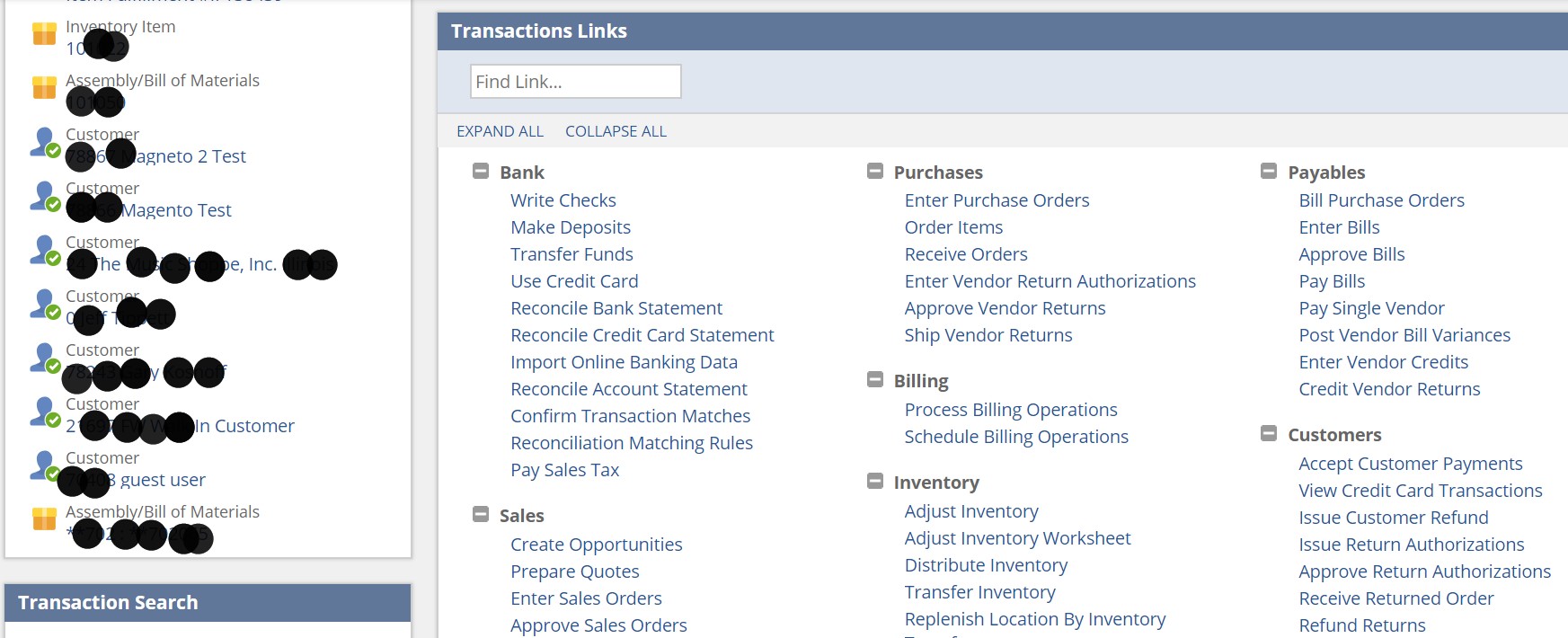
The Lists section contains the following List Links categories: Accounting, Relationships, Mailing, Supply Chain, Marketing, Search, Employees, Web Site, and Mass Update.
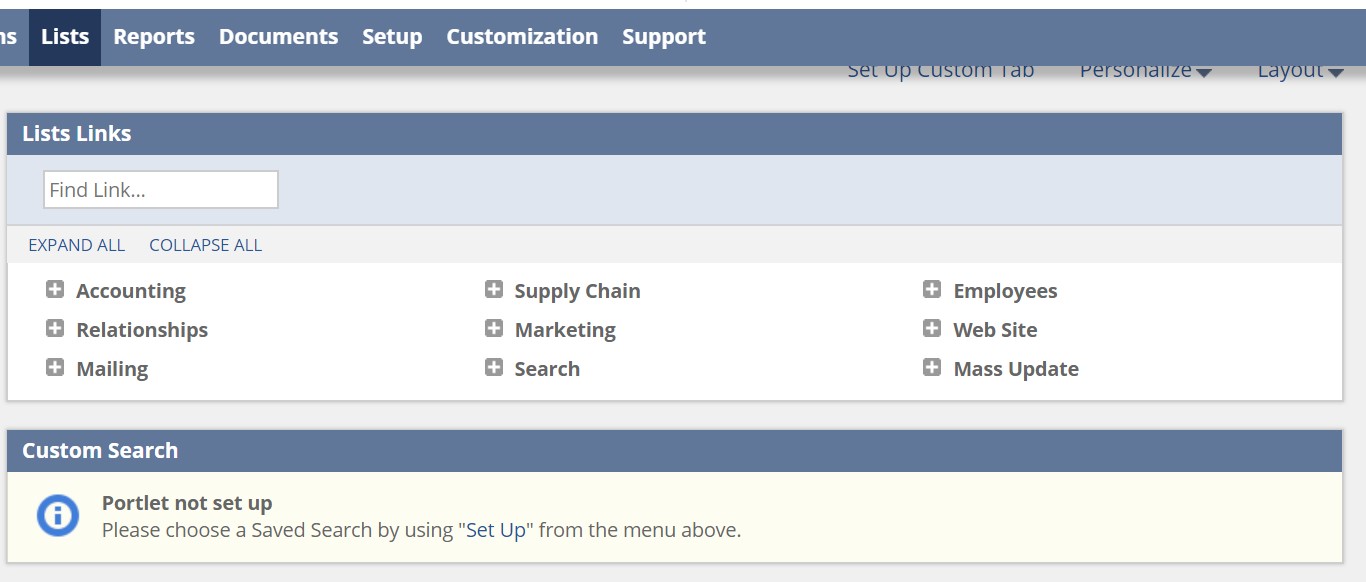
As for the Reports section, it impresses with its wide variety of options. There are hundreds of them divided into 21 sections in NetSuite.
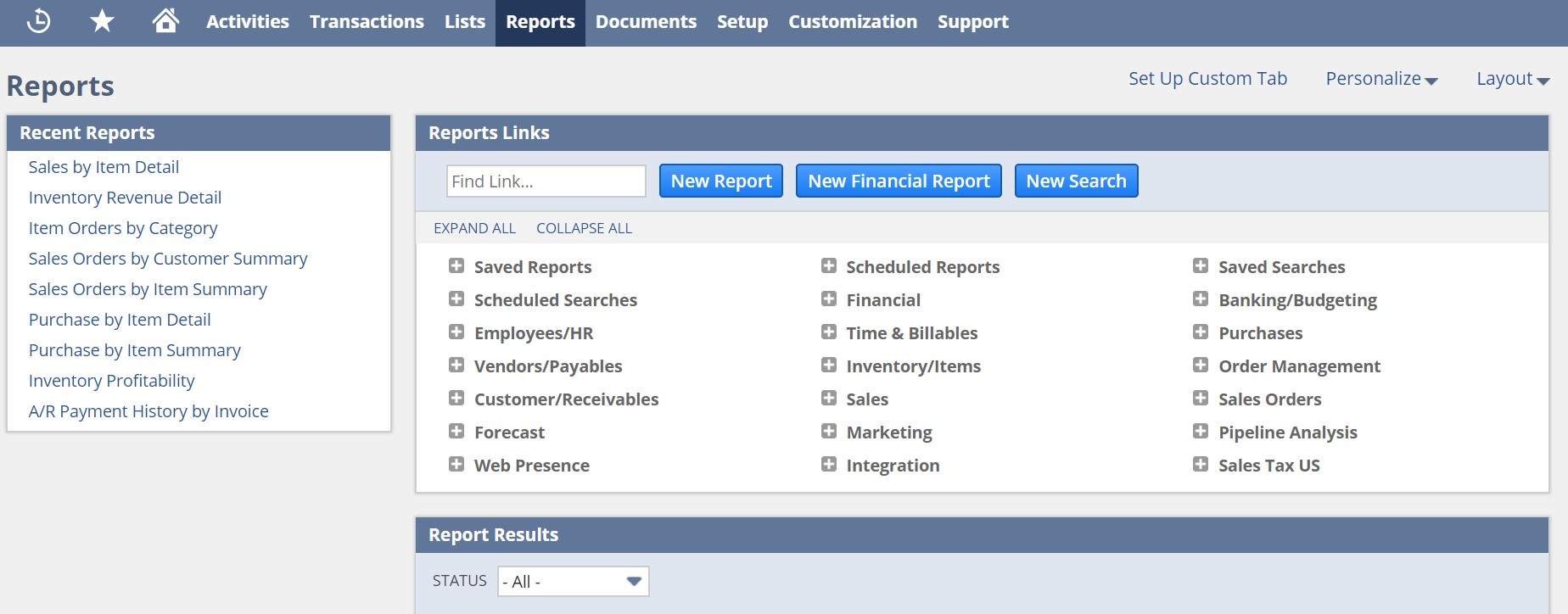
The Documents section offers a file cabinet that looks as follows:
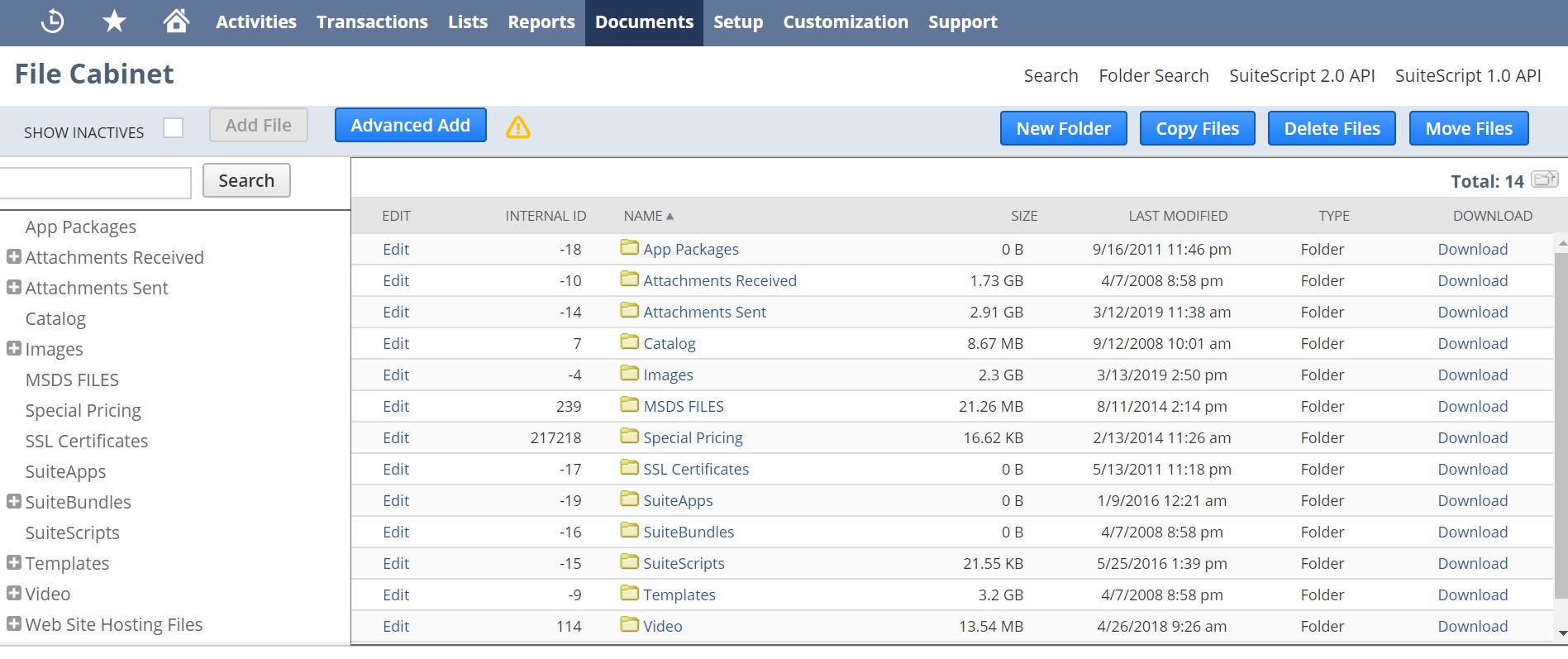
The Setup section contains the configuration of your NetSuite account.
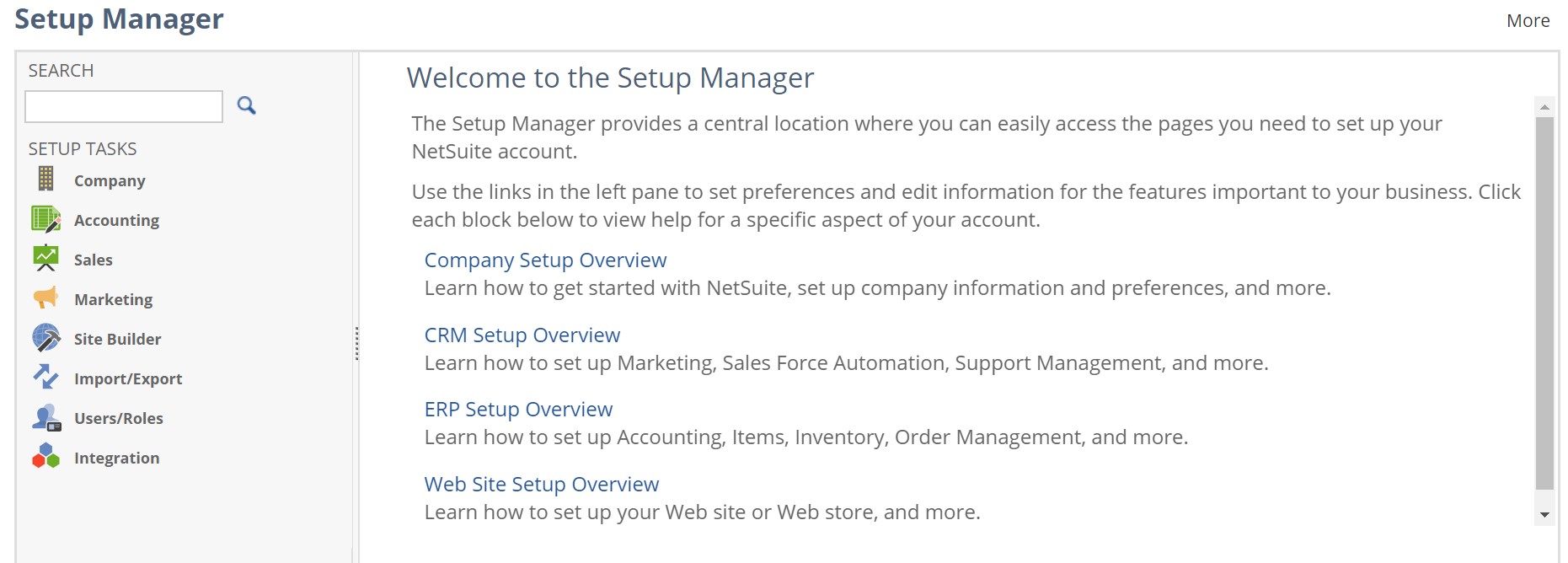
The Customization section is associated with the ability to apply more complex changes.
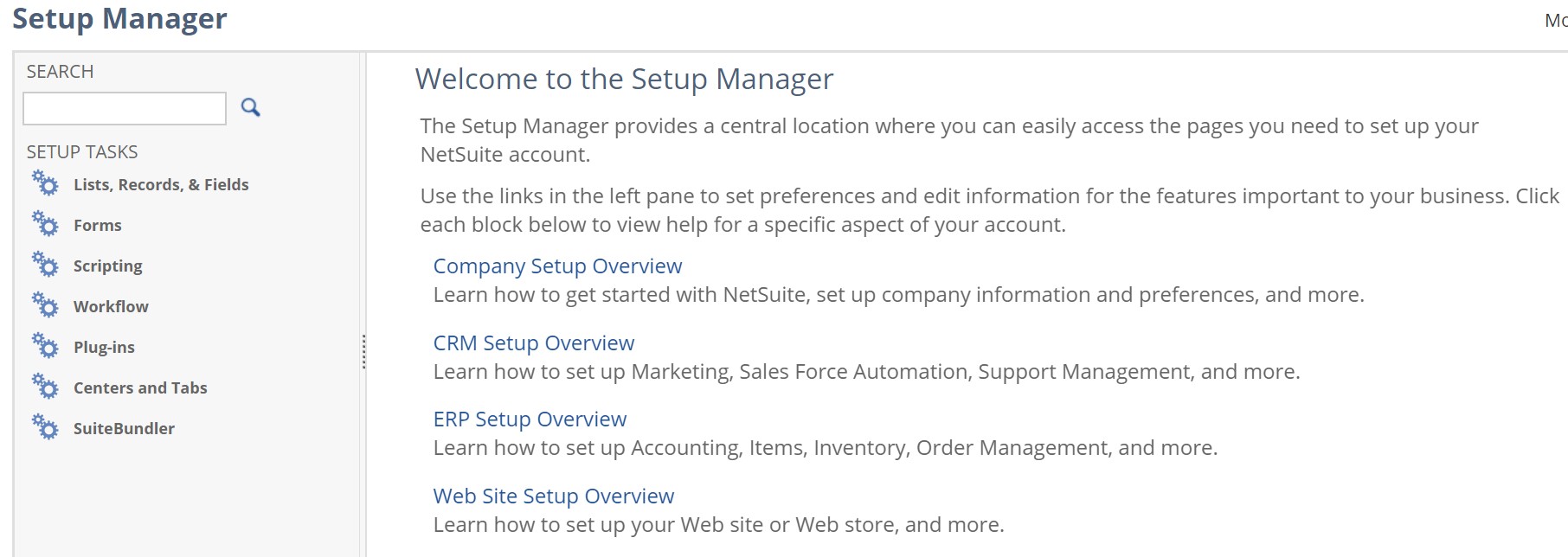
The Support section is at your disposal every time you face difficulties working with NetSuite.
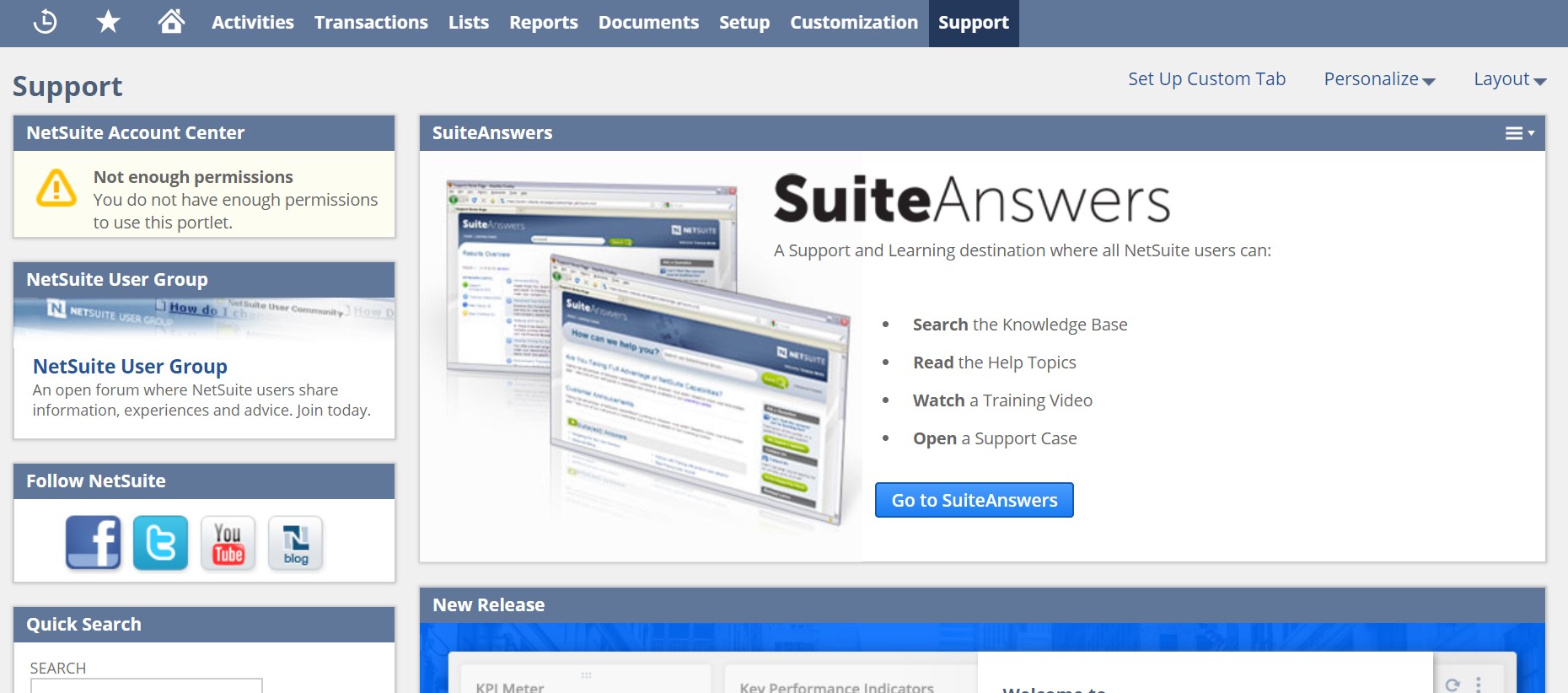
For further information, follow these links:
Shopware 6 Oracle NetSuite Integration
Oracle NetSuite needs continuous data updates from your Shopware 6 website to provide you with the most in-depth insights into your e-commerce business. However, it is impossible to sync the two instances in a few clicks. It is always necessary to use external participants to move your data to the ERP system. You need a reliable Shopware 6 Oracle NetSuite connector that provides Oracle with your e-commerce information and transfers the corresponding output back.
While it is still possible to use the default Shopware 6 export to generate the output that Oracle NetSuite requires, this procedure will consume tons of time since the outcome won’t be suitable without editing. Therefore, we recommend you pay attention to the Improved Import, Export & Mass Actions application for Shopware 6. The app offers the following features:
Two-way connection
A two-way connection between Shopware 6 and Oracle NetSuite is a groundbreaking feature of our application. The module offers highly-configurable import and export profiles that can be customized according to the needs of any third-party system. You don’t need to set up both functionalities at the same time since import and export profiles are independent.
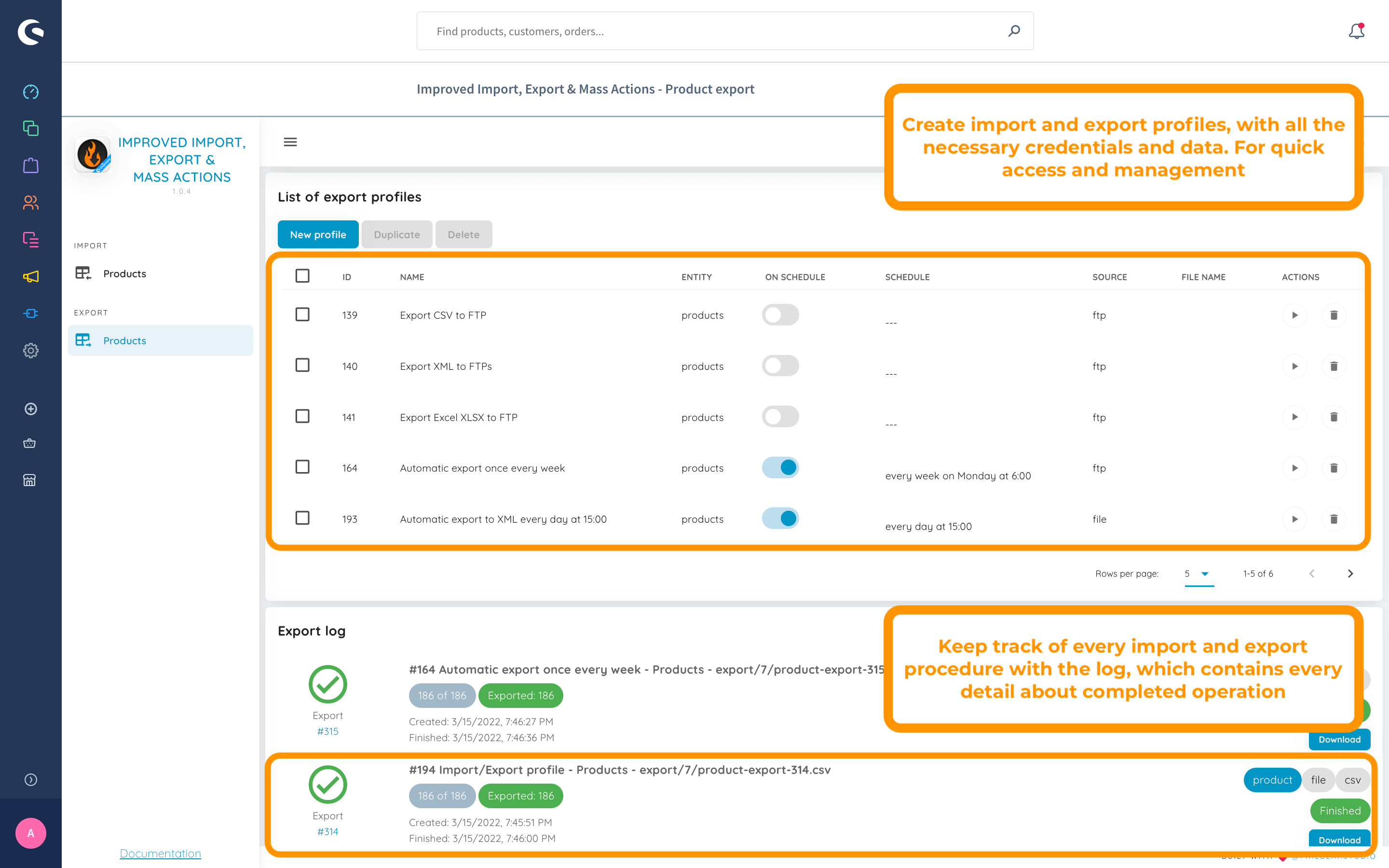
Scheduler
Due to a built-in scheduler, you can fully automate your Shopware 6 Oracle NetSuite integration. You can apply different update schedules to import and export processes associated with the same entity. For instance, it is necessary to transfer customer data to Oracle NetSuite weekly:
- Go to your export profile and choose weekly updates.
- Next, select a day of the week and the exact time of the transfer.
- If you need to provide Oracle NetSuite with the new data before the scheduled, leverage the asynchronous mode, launching the profile manually.
- Go to your import profile and apply similar changes but select daily updates.
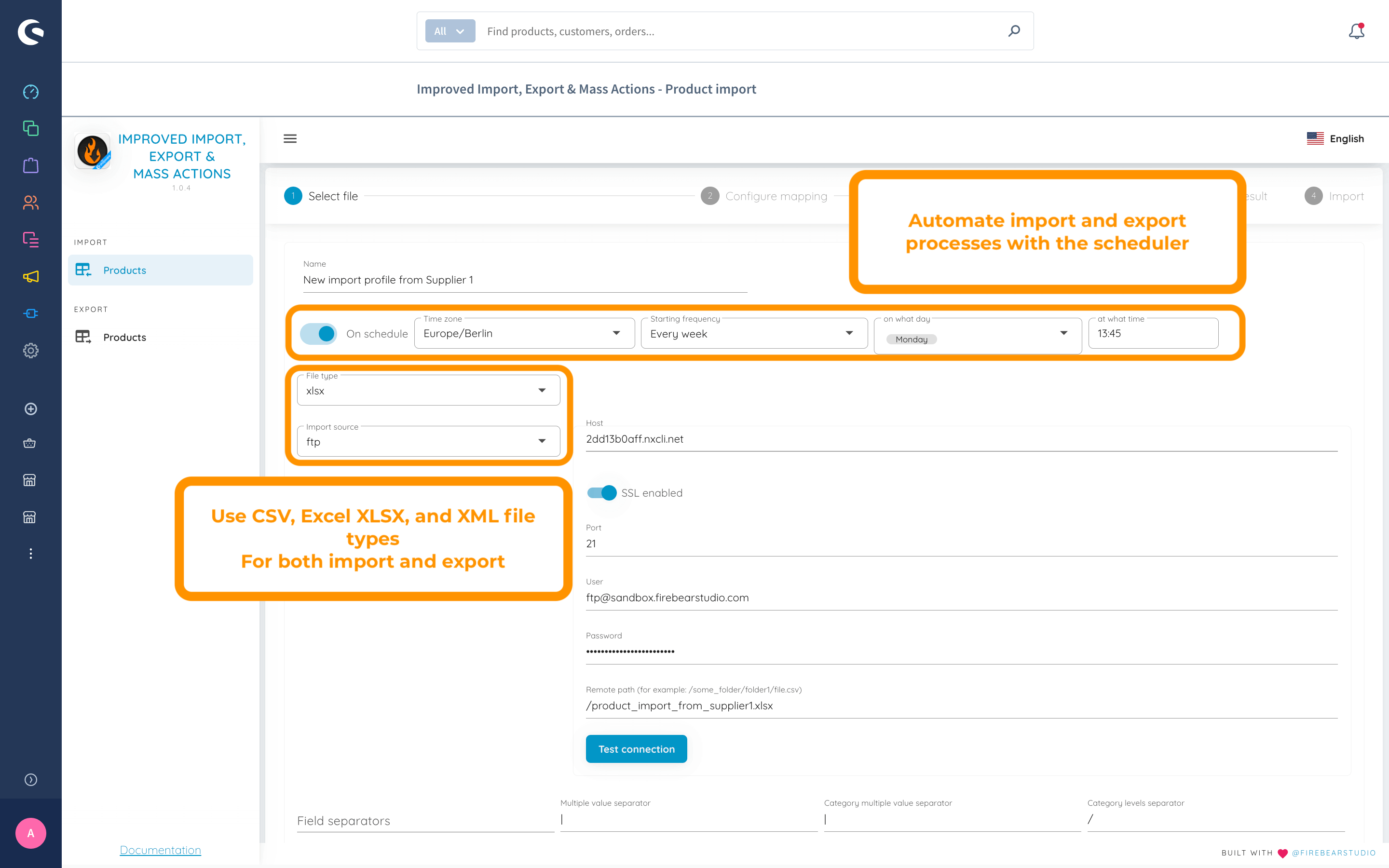
Mapping
The Improved Import & Export Shopware 6 extension dramatically simplifies the way you sync data between your Shopware 6 store and any external system. Since data updates should always be edited according to the standards of the accepting platform (either Shopware 6 or Oracle NetSuite), it is necessary to match third-party attributes to the requirements of the native environment. Therefore, a default Shopware 6 output should be edited with the Oracle NetSuite conditions in mind. Here, our extension introduces mapping functionality.
The Improved Import, Export & Mass Actions application for Shopware 6 provides the ability to leverage the mapping grid that appears in every import and export profile, where you can create a corresponding mapping scheme matching Shopware 6 attributes to the rules and requirements of Oracle NetSuite and vice versa.
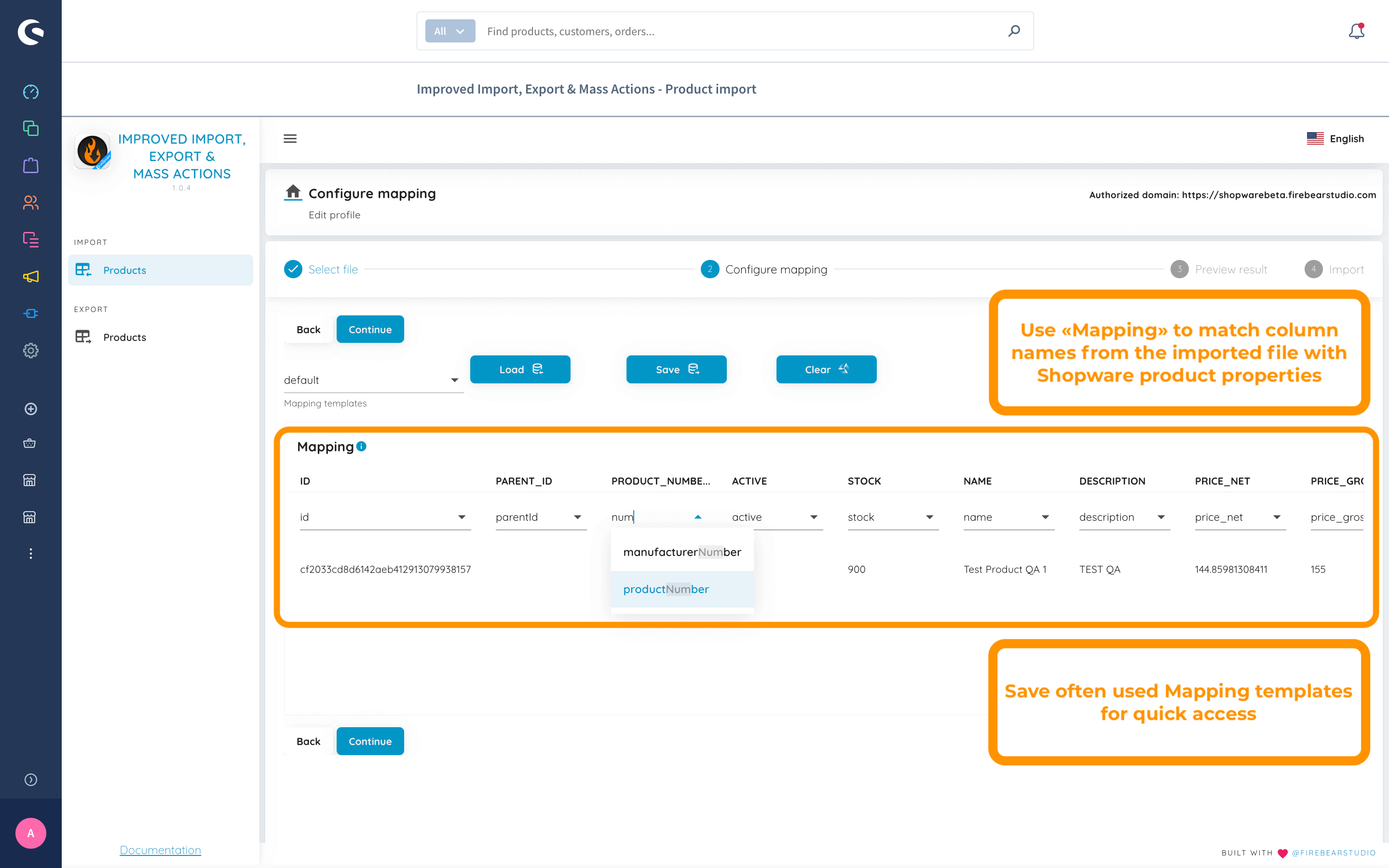
The intuitive product properties mapping provides the ability to import files with products to your store from any source. No matter how the columns are named, match the column names from the file to import with the property names from your Shopware 6 store.
You can also save and load the mapping profiles for further use. It is useful when you need to repeat import and export processes on a regular basis, just like in the case of the Shopware Oracle NetSuite integration.
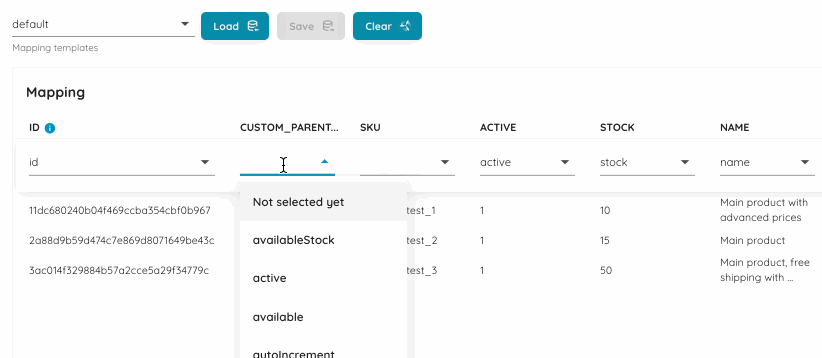
Other features
The Improved Import & Export Shopware 6 application supports multiple connection standards. It provides the ability to utilize data files of different types to run every integration. You can rely on XML, CSX, XLSX, ODS, and Json formats.
The application also offers another connection possibility which is associated with Google Sheets. The Improved Import & Export Shopware 6 app provides the ability to sync all data between your store and this platform. Other data exchange points include Google Drive, OneDrive, Dropbox, FTP/SFTP, and direct URL uploads. Besides, the Improved Import, Export & Mass Actions application for Shopware 6 allows leveraging the API connection for integrations that require more customizations.
Shopware 6 Oracle NetSuite Integration Case Study
To provide a better understanding of the platform and see the possibilities related to the Shopware 6 Oracle NetSuite integration, let’s say a few words about the ERP’s structure. NetSuite consists of several core modules with a shared database. Some of them require data from your e-commerce website to empower each module’s tools and features. The interconnectivity of all platform’s components enables continuous data flow that tightly connects all NetSuite tools and provides the ability to reinforce the network within the entire enterprise on the basis of the Improved Import & Export Shopware 6 application. Let’s take a look at several ways of synchronizing data between Shopware 6 and Oracle NetSuite.
Order Management
The Order Management module of NetSuite plays an essential role in many daily processes. For instance, it improves cash flow and enhances on-time delivery, reducing shipping costs. Besides, the tool is responsible for CRM integration. Its components include:
- Pricing and Promotions. You can handle numerous price levels, specific pricing options, and discounts with the aid of this tool. Besides, it is responsible for promotion codes. You can also get insights into transaction-level gross profit using the solution.
- Sales Order and Returns Management. This module is represented by a dedicated dashboard that visualizes various processes. It displays taking, approving, scheduling, tracking, fulfilling orders as well as getting paid and handling returns.
Orders are another entity that you can easily transfer from Shopware 6 to Oracle NetSuite. The Improved Import, Export & Mass Actions application for Shopware 6 provides the ability to send order data from your Shopware store to Oracle NetSuite when customers make new purchases.
Sync Orders Between Shopware 6 and NetSuite
Warehouse & Order Fulfilment
This module contains all the tools necessary for efficient order fulfillment and warehouse management for both local and global businesses. The following features are under your disposal:
- Inbound/Outbound Logistics. The corresponding module provides accessible dashboards where you can manage automated I/O processes. It is also possible to expedite orders there as manage containers and schedule specific receipt dates. Besides, the solution enables the monitoring of material flows and quality.
- Inventory Management. Automated inventory tracking, stock safety, reorder points, demand planning, cycle counts, and numerous other enhancements are built into this feature.
- Warehouse Management. This module offers mobile RF barcode scanning, picking strategy definition, returns authorization, task management, cycle count plans, etc.
The Improved Import, Export & Mass Actions application for Shopware 6 lets you take all the information necessary for order fulfillment and move it to the ERP system. Transferring the corresponding output back is also possible.
Sync Warehouse Data Between Shopware 6 and NetSuite
Financial Management
With the Financial Management module, users get real-time access to economic data. It links accounting and compliance management processes resulting in accelerated closings and more accurate reporting. The other features of the module include:
- Finance and Accounting. With this tool, you get core accounting functions, real-time financial visibility, and various business insights.
- Billing. This module integrates sales, finance, and fulfillment. As a result, you get seamless processing of the corresponding data.
- Revenue Recognition. More intuitive and user-friendly compliance and schedules are at your disposal.
- Financial Planning and Reporting. The name of this tool speaks for itself. It is responsible for planning, budgeting, and forecasting. Besides, you can render real-time, on-demand, and decision-making data with its help.
- Global Accounting. “Close-to-disclose” capabilities are based on this module. It also supports international compliance and regulations so that you can accelerate closings, eliminating issues caused by their potential complexity.
- Governance, Risk, and Compliance. As for this tool, its role comes down to addressing regulatory and risk issues, using the latest technology achievements and automation.
Use the Improved Import, Export & Mass Actions application to provide all the necessary financial data from Shopware 6 to Oracle. Easily import the corresponding output back to your e-commerce website.
Sync Financial Data Between Shopware 6 and NetSuite
Customer Data
Every time a new customer is registered on your website, the Improved Import, Export & Mass Actions application for Shopware 6 transfers it to Oracle NetSuite. Also, if a customer changes the existing account data, the app transfers the update to the CRM system automatically. You can synchronize different customer info, such as Lead, Contact, and Account from Shopware 6 to different modules in Oracle NetSuite automatically.
Sync Customer Data Between Shopware 6 and NetSuite
Production Management
With the Production Management module, you can manage global manufacturing operations as well as achieve better on-time delivery. Its core feature set consists of the following features:
- Product Data. All product information is available within the same system. Furthermore, it is fully shareable across all teams and departments.
- Work Order. With this feature, you get advanced configuration control over critical processes. It enables automated batch creation and offers full traceability. Besides, you get a bunch of production controls and scheduling options.
- Planning & Scheduling. Plan material purchases and inventory positioning. Besides, you can create schedules for employees, machines, and entire work centers. The module incorporates these and other features to assure on-time delivery.
- Quality Assurance. Conduct QA tests with custom parameters towards items and operations to improve the existing quality of your products and services.
- MES. This app is responsible for a barcode scanner with a corresponding interface delivered via an interactive tablet app. Render production facility information faster and with less effort.
If your e-commerce business incorporates production, then you will leverage this part of Netsuite and the Improved Import, Export & Mass Actions application will help you to sync the two systems.
Sync Production Data Between Shopware 6 and NetSuite
Supply Chain Management
The Supply Chain Management module is another core instrument of NetSuite. It delivers real-time visibility of processes for increasing service levels and decreasing costs. And you can freely provide it with all the required data with Improved Import, Export & Mass Actions. The app will transfer the necessary output straight to the Supply Chain Management module. As for the module itself, it offers the following tools and enhancements:
- Planning. You can reach an entirely new level with inventory management due to this module. It implements various “demand planning” techniques and improves on-time delivery metrics.
- Execution. Better supply chain management is also achieved due to a communication platform for distributors, manufacturers, suppliers, and other partners.
- Collaboration. It is another module that improves connections and leads to a better understanding of your employees and partners. The tool enables automatic and instant communication via email as well as provides portal access to supply chain partners. Other integrated system connections are possible too.
- Support. Address customer issues faster and with less effort. NetSuite offers a dedicated case management system that helps you resolve problems.
Sync Supply Chain Data Between Shopware 6 and NetSuite
Procurement
NetSuite also delivers the following features associated with the Procurement module:
- Source. This tool enables automatic batch creation, full traceability, production control, and scheduling. These and other enhancements lead to better manufacturing processes.
- Purchase. With this tool, you define how to control the flow and approval of requisitions to purchase, automating a considerable part of your daily chores.
- Pay. Another source of automation is delivered via this graphical workflow tool. It is responsible for ordered items recipes, vendor bills, and plan payments.
To make your business more efficient in terms of procurement, use the Improved Import, Export & Mass Actions application. The app will help you provide the NetSuite ERP with the corresponding output. Thus, your module will automatically get all the information it requires, and you will receive the output necessary for well-thought decision-making.
Sync Procurement Data Between Shopware 6 and NetSuite
Human Capital Management
SuitePeople, or the Human Capital Management platform, enables HR administrators to streamline employee information for numerous processes from hiring to firing. The core elements of this module include:
- Core HR Features. Manage jobs and positions, workflows and compliance with a unified flow of data. Make smarter decisions with real-time updates and integrated sources of information.
- Payroll. This solution enables multi-jurisdiction tax management and is tightly connected with the accounting module. You can leverage an intuitive system of benefits and deductions with its help.
- Employee Center is a dashboard that displays all key metrics about your employees, including the organization’s hierarchy.
- Analytics. All key metrics are visualized here, including the company’s growth, turnover trends, and other significative.
Any data that your Shopware 6 website generated and that is required by SuitePeople can be easily provided to the Human Capital Management module if you use the Improved Import, Export & Mass Actions application.
Sync HR Data Between Shopware 6 and NetSuite
[embedded content]
If you have any questions about the application or the Shopware 6 Oracle NetSuite integration, please, contact our support. We can add any entity to the integration. You only need to send your inquiry. For further information about the Shopware 6 Oracle NetSuite integration, follow this link:
Download/Buy Firebear Improved Import & Export Shopware 6 Application




